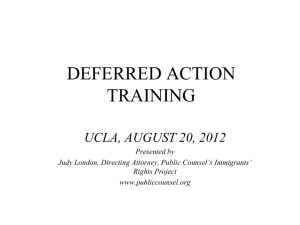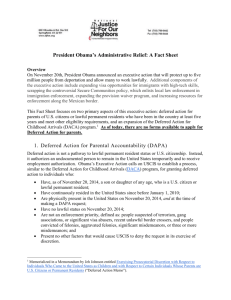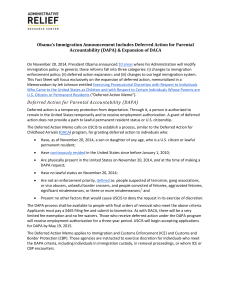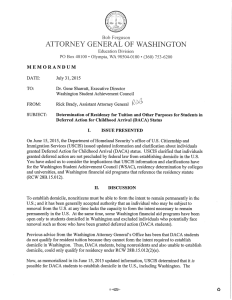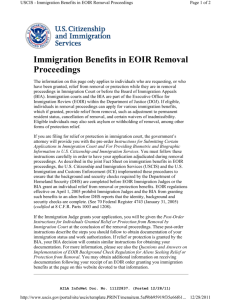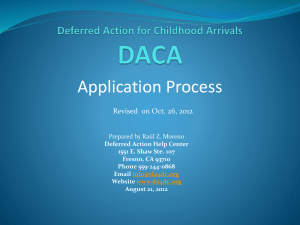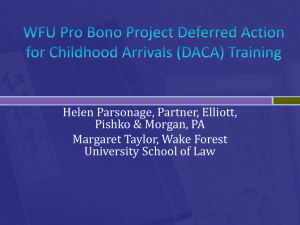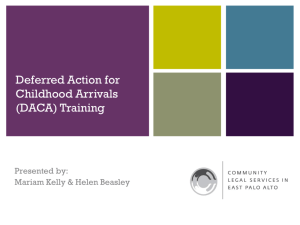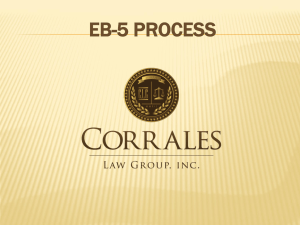DACA - CVLS Powerpoint Presentation
advertisement
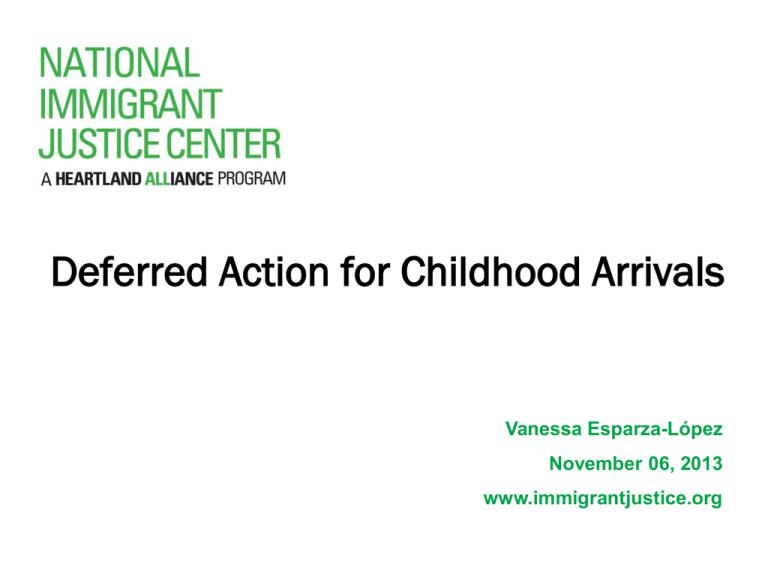
Deferred Action for Childhood Arrivals Vanessa Esparza-López November 06, 2013 www.immigrantjustice.org About the National Immigrant Justice Center • The National Immigrant Justice Center (NIJC), a program of Heartland Alliance, promotes human rights and access to justice for immigrants, refugees, and asylum seekers through legal services, policy reform, impact litigation and public education. • NIJC is a Board of Immigration Appeals (BIA) recognized legal organization based in Chicago with more than 40 staff that includes attorneys, BIA accredited representatives and other professional legal staff. • NIJC serves more than10,000 immigrants annually with the support of a professional legal staff and a network of over 1,500 pro bono attorneys. Background • On June 15, 2012, the Obama administration announced that certain young immigrants who were brought to this country as children and educated in the United States should not be deported, but instead granted temporary status and work authorization. • Estimates for potentially eligible youth: – ~ 1.5 million youth nationally – ~ 75,000 in Illinois Updates on DACA processing • More than 567,000 DACA applications have been filed • More than 455,000 have been approved • Less than 10,000 have been denied Review of Basic Eligibility Requirements • Arrived in the United States before the age of sixteen; • At least 15 years old at the time of filing for DACA (if currently in removal proceedings, may apply before 15); • Under the age of 31 on June 15, 2012; • Physically present June 15, 2012; • No lawful status on June 15, 2012; • Continuous residence in the United States from June 15, 2007 to the time of filing; • Currently enrolled in school or in GED classes, graduated from high school or obtained a GED certificate, or have honorable discharge from the U.S. Coast Guard or Armed Forces; and • Have not been convicted of a felony offense, a significant misdemeanor offense, multiple misdemeanor offenses, or otherwise pose a threat to national security or public safety What is the Benefit? • Eligible individuals will receive deferred action for a period of two years, subject to renewal • Individuals may be granted an employment authorization document if demonstrate economic necessity • Obtaining an employment authorization document qualifies an individual to obtain a social security number and in most states, a driver’s license • Does NOT qualify individuals to receive federal financial aid for education (FAFSA) Deferred Action • Discretionary determination to defer removal action of an individual as an act of prosecutorial discretion • Does NOT confer lawful status • If granted, the individual will not be considered to be accruing unlawful presence • Does not absolve individuals of any previous or subsequent periods of unlawful presence Current/Prior Removal Proceedings If otherwise eligible, may apply with U.S. Citizenship & Immigration Services (USCIS) if: • has never been in removal proceedings • is currently in removal proceedings • has a final order of removal* • was granted voluntary departure* • Currently individuals in immigration detention may not apply with USCIS, but can apply with ICE * May not be eligible if individual left the United States after being ordered removed or granted voluntary departure after June 2007 * Educational and Military Requirements On the date of filing: • Must be enrolled in school or graduated from high school • Must have a GED certificate or be enrolled in GED classes OR • Demonstrate honorable discharge from the U.S. Coast Guard or Armed Forces Legal Status Requirements • May not have legal status on the date of filing application; AND • Did not have legal status on June 15, 2012 Example: A person with F-1, student status on June 15, 2012, if status expired after June 15th, is not eligible for DACA. • However … may apply for deferred action if an application for asylum or cancellation of removal, or similar relief, is pending before either USCIS or EOIR as of June 15, 2012, but had no lawful status Continuous Residence and Departures from the United States • Certain departures from the United States will not interrupt continuous residence if they were “brief, casual, and innocent” • A departure after June 15, 2007 will be considered “brief, casual, and innocent,” if: – The absence was short and reasonably calculated to accomplish the purpose for the absence; – The absence was not because of an order of exclusion, deportation, or removal; – The absence was not because of an order of voluntary departure, or an administrative grant of voluntary departure before you were placed in exclusion, deportation, or removal proceedings; and – The purpose of the absence and/or your actions while outside the United States were not contrary to law. Criminal Issues Not eligible if convicted of: • Felony: punishable by imprisonment for a term exceeding one year; or • Significant misdemeanor: maximum term of imprisonment authorized is one year or less but greater than five days and: – domestic violence; sexual abuse or exploitation; burglary; unlawful possession or use of a firearm; drug distribution or trafficking; or, driving under the influence; or, – An offense with a sentence to time in custody of more than 90 days (not including suspended sentence); or • Multiple misdemeanors: three or more misdemeanors not occurring on the same date and not arising out of the same act, omission, or scheme of misconduct DHS retains the discretion to deny on the basis of any conviction Other Criminal Factors Expunged Convictions and Juvenile Offenses • May not automatically disqualify • Will be considered for discretion • Juveniles convicted as adults, will be treated as adults Traffic violations • Driving without a license is a misdemeanor in Illinois. However, USCIS has indicated that minor traffic offenses (e.g. driving without a license) will not be considered a misdemeanor for purposes of this process. National Security Concerns/Public Threat • May not be eligible if – Currently in a gang – Participates in criminal activities that threaten the United States Eligibility Requirements - What Must be Proven? • Age • Identity • Educational or military requirement • Continuous residence (June 15, 2007 - present) • Physical presence in the U.S. on June 15, 2012 • If arrested, disposition of arrest Affidavits Two or more affidavits sworn to by people other than applicant who have direct personal knowledge may be used when there is: • A gap in the documentation regarding evidence of five year continuous residence requirement; or • A shortcoming in documentation with respect to the brief, casual and innocent departures May not be used to show: • Educational requirements; • Military requirements; • Physical presence in the United States on June 15, 2012; • Entry to the United States prior to 16th birthday; • Age requirements; and • Criminal history Application Process • Cost = $465.00 • USCIS will issue receipt notices within 2-4 weeks of receiving application packet • USCIS will schedule applicant for biometrics appointment within 4-6 weeks • Applicants’ names are checked against “name-check” databases and criminal databases • USCIS may issue request for evidence (“RFE”), if initial evidence is deemed to be insufficient • USCIS may request an interview in limited cases • Average Processing Time ~ 6 months Fee Exemption Fee Exemption Applicant may be eligible for a fee exemption if his/her income is less than 150% of the U.S. poverty level and: • he/she is under 18 years old and homeless, in foster care, or otherwise lacking any familial support; or • he/she cannot care for yourself because of a serious, chronic disability; or • he/she, at the time of your application, accumulated $25,000 or more in personal debt as a result of unreimbursed medical expenses for you or an immediate family member. This debt must have been accumulated within the past 12 months. Fee exemption must be authorized by USCIS prior to filing DACA application Denied Applications • There is no appeal of a denial of DACA • May result in the initiation of removal proceedings – Information is protected from disclosure to ICE and CBP for the purpose of immigration enforcement (including for family members or guardians) unless the applicant meets the criteria for the issuance of a Notice To Appear • Individuals in removal proceedings who believe their cases were not correctly handled may contact the ICE Office of the Public Advocate either – by phone at 1-888-351-4024 – or by e-mail at EROPublicAdvocate@ice.dhs.gov Travel Outside the U.S. Once DACA is approved, certain individuals may travel outside the United States with advance parole... • For certain reasons, such as employment, humanitarian, and education • Must apply for and obtain advance parole before departure • Even if advance parole is granted, it may still not be advisable for the individual to travel outside of the United States Renewal of Deferred Action • May renew after two years (if this program still exists) • If an individual applies for and receives an extension of the period for which he or she was granted deferred action, he or she must also request an extension of his or her employment authorization • Legislative debate suggests that if an immigration reform bill passes, DACA applicants would have a streamlined path to permanent legal status Other Info… These factors will not impact eligibility for DACA, although they could be problems for the individual when applying for other immigration remedies: • Using a false social security or other name to work • Claiming U.S. citizenship or LPR status • Using different names on school or employment records • Certain criminal convictions Eligibility for Other Immigration Remedies NIJC screens all potential DACA applicants for eligibility for other immigration benefits • Has been a victim of a violent crime • Has a U.S. citizen or lawful permanent resident spouse/partner, parent or child • Has been in the U.S. for more than 10 years • Is afraid to return to her/his country of nationality because of her/his political opinion, race, religion, nationality or membership in a particular social group (including, gender or sexual identity) Resources • www.uscis.gov – U.S. Citizenship & Immigration Services (USCIS) – to obtain forms or information regarding deferred action • www.uscis.gov/childhoodarrivals - USCIS’ DACA FAQs – this is the authoritative resource regarding eligibility • www.immigrantjustice.org/dreamers - NIJC’s information page regarding deferred action • www.usdoj.gov/eoir - Executive Office for Immigration Review – EOIR (immigration courts or Board of Immigration Appeals) • 800-898-7180 – EOIR’s automated number at which you can find out if applicant was previously ordered removed, granted voluntary departure or is currently in removal proceedings. Questions… ThankYou You! Thank Vanessa Esparza-López, Supervising Attorney 312.660.1607 vesparza-lopez@heartlandalliance.org National Immigrant Justice Center 208 S LaSalle St, Suite 1300 Chicago, IL 60604 www.immigrantjustice.org
